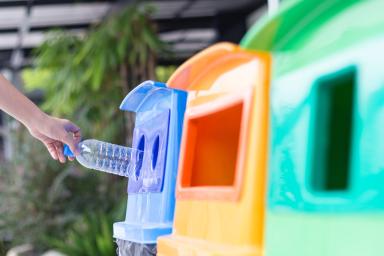Ideas for sustainable packaging for start-ups
Businesses are being encouraged to do all they can to tackle climate change.
The Government has pledged that the UK is committed to becoming a net zero nation by 2050 and has enacted legislation such as the Plastic Packaging Tax to reduce the use of plastic within packaging.
Consumers are also looking for businesses to reduce their use of plastic packaging.
A study by the Chartered Institute of Marketing found that 88% of adults think their shopping uses more packaging than needed.
Around 80% of consumers want to see companies do more to promote sustainable packing, and 36% of UK adults judge a brand’s ethics on its packaging.
From reducing packaging space to assessing the sustainability credentials of supply chains, here is how your start-up can develop a sustainable packaging strategy.
How to create a sustainable packaging strategy
There are a variety of quick fixes and sustainable packaging alternatives to plastic that start-ups can use.
This encompasses packaging for shipping products to consumers, as well as B2B transport and logistic packaging as part of a supply chain.
The Sustainable Packaging Coalition has a helpful guide to what sustainable packaging is and how to define it – from its use of recycled source materials to being designed to optimise materials and energy use.
Assess your existing packaging
Examine all the packing materials and processes your start-up currently uses.
You should examine the packaging you use when sending products to customers and the packaging suppliers use when sending materials to you. You should assess:
- Volumes – How much packaging do you use, and how much of it is sustainable?
- Materials – What materials is the packaging made from? Are these easily recycled, compostable, or reusable?
- Transport – How is packaging used in transport? How effectively is space used? How bulky is it?
- Disposal – How is your packaging disposed of? Are customers clear on how to recycle packaging effectively?
- Regulations – What regulations could impact your packaging, such as the Plastic Packaging Tax?
Set packaging goals
With measurements complete, set some goals for replacing and switching to more sustainable packaging. These can include:
- goals such as the percentage of your packaging that can be recycled, reused, renewed, or composted.
- goals that encourage more effective use of packaging space, resulting in less packaging needed, fewer transportation costs, and carbon emissions.
Try to ensure your goals are easily and consistently measurable.
Plan and act
Involve your team, customers, suppliers, and investors in your packaging plan and ask for their ideas on switching to more sustainable packaging.
Ask suppliers to source alternative materials and consider switching to new suppliers that use more sustainable packaging materials.
Regularly measure your performance and chart your progress, so you know which areas are effective.
Sustainable packaging examples
Your start-up can take plenty of approaches to switch to more sustainable packaging.
Using less mixed packaging
When deciding what material to use for your packaging, stick to just one if possible.
Using mixed packaging can lead to issues for your customers further down the line with recycling.
Be clear on disposal
Make sure that customers know how to dispose of your packaging.
Include recycling instructions and advice, such as removing non-recyclable tape and advice on composting it.
Use non-toxic water-ink
If your start-up needs to print packaging labels, eco-friendly water-based inks are considered less harmful than plastisol inks.
Plastisol ink has damaging environmental effects, as they’re made of toxic materials such as plasticisers and polyvinyl chloride (PVC).
Water-based inks are more environmentally friendly with fewer chemicals than plastisol inks.
Use alternative packaging materials
There are lots of alternatives to plastic packaging that are readily available, including:
- cardboard – used worldwide as a cheap and readily available packaging material. It’s easy to recycle and an inexpensive alternative for your packaging suppliers to manufacture.
- biodegradable packing peanuts – instead of lining your packaging with plastic bubble wrap, use biodegradable packing peanuts. Traditional packing peanuts are made from polystyrene, and, according to Swiftpak, they can threaten waterways and natural ecosystems once they’re disposed of.
- bioplastics – have similar properties to plastics but are usually made from natural materials such as the sugars in corn starch, cassava or sugarcane.
- compostable packaging – this is packaging that is biodegradable. Plant-based and natural materials form the basis of compostable packaging.
- corrugated packaging – according to the CPI, corrugated packaging is sourced from sustainable forestry resources, is non-toxic, and is easily recyclable.
Learn with Start Up Loans and help get your business off the ground
Thinking of starting a business? Check out our free online courses in partnership with the Open University on being an entrepreneur.
Our free Learn with Start Up Loans courses include:
- Entrepreneurship – from ideas to reality
- First steps in innovation and entrepreneurship
- Entrepreneurial impressions – reflection
Plus free courses on climate and sustainability, teamwork, entrepreneurship, mental health and wellbeing.
Tags related to this content:
Disclaimer: The Start -Up Loans Company makes reasonable efforts to keep the content of this article up to date, but we do not guarantee or warrant (implied or otherwise) that it is current, accurate or complete. This article is intended for general information purposes only and does not constitute advice of any kind, including legal, financial, tax or other professional advice. You should always seek professional or specialist advice or support before doing anything on the basis of the content of this article.
The Start-Up Loans Company is not liable for any loss or damage (foreseeable or not) that may come from relying on this article, whether as a result of our negligence, breach of contract or otherwise. “Loss” includes (but is not limited to) any direct, indirect or consequential loss, loss of income, revenue, benefits, profits, opportunity, anticipated savings, or data. We do not exclude liability for any liability which cannot be excluded or limited under English law. Reference to any person, organisation, business, or event does not constitute an endorsement or recommendation from The Start-Up Loans Company, its parent company British Business Bank plc, or the UK Government.
Your previously read articles
Sign up for our newsletter
Just add your details to receive updates and news from Start Up Loans
Sign up to our newsletter


